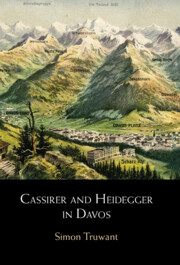Book contents
- Cassirer and Heidegger in Davos
- Cassirer and Heidegger in Davos
- Copyright page
- Contents
- Acknowledgements
- Introduction
- 1 Reconstructing the Davos Debate
- Part I The Lasting Meaning of Kant’s Thought
- 2 Cassirer’s Transformation of the Critique of Reason into a Critique of Culture
- 3 Heidegger’s Reading of Transcendental Philosophy as Phenomenological Ontology
- 4 Receptivity or Spontaneity
- Part II ‘What Is the Human Being?’
- Part III The Task of Philosophy
- Bibliography
- Index
4 - Receptivity or Spontaneity
Two Readings of the Critique of Pure Reason
from Part I - The Lasting Meaning of Kant’s Thought
Published online by Cambridge University Press: 05 May 2022
- Cassirer and Heidegger in Davos
- Cassirer and Heidegger in Davos
- Copyright page
- Contents
- Acknowledgements
- Introduction
- 1 Reconstructing the Davos Debate
- Part I The Lasting Meaning of Kant’s Thought
- 2 Cassirer’s Transformation of the Critique of Reason into a Critique of Culture
- 3 Heidegger’s Reading of Transcendental Philosophy as Phenomenological Ontology
- 4 Receptivity or Spontaneity
- Part II ‘What Is the Human Being?’
- Part III The Task of Philosophy
- Bibliography
- Index
Summary
Tackles the two main issues of contention between Cassirer's and Heidegger’s interpretations of Kant. I first examine why Heidegger opposes his own ‘ontological reading’ of the first Critique to the ‘epistemological reading’ that he attributes to the Neo-Kantians. I clarify what this opposition entails and consider in what way it indeed applies to Cassirer (4.1). Next, I turn to Cassirer and Heidegger's more specific disagreement regarding the relevance of Kant's account of transcendental imagination. Remarkably, both thinkers not only value how this account attempts to undercut the artificial opposition between receptivity and spontaneity (4.2), but their agreement extends to the shared thesis that Kant ultimately did not succeed because he lacked a truly phenomenological method (4.3). Yet, Cassirer and Heidegger still radically part ways as soon as they evaluate why this (failed) attempt is so important: while Heidegger takes transcendental imagination as the ground of human reason’s finite nature, Cassirer concludes from the primacy of this faculty to the fundamentally spontaneous character of reason (4.4).
Keywords
- Type
- Chapter
- Information
- Cassirer and Heidegger in DavosThe Philosophical Arguments, pp. 85 - 108Publisher: Cambridge University PressPrint publication year: 2022

